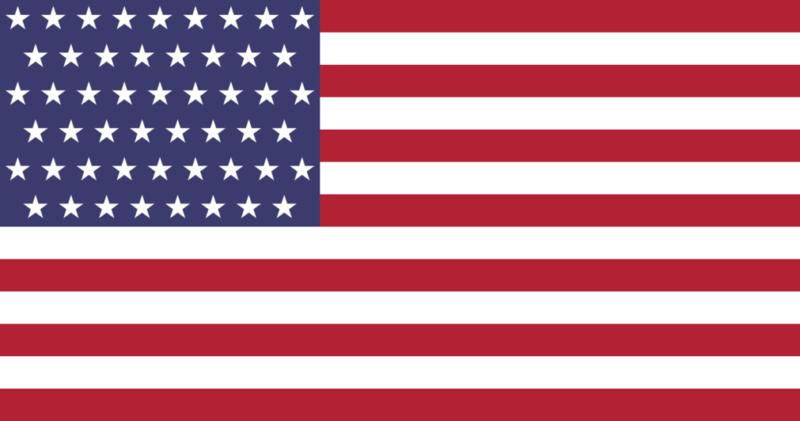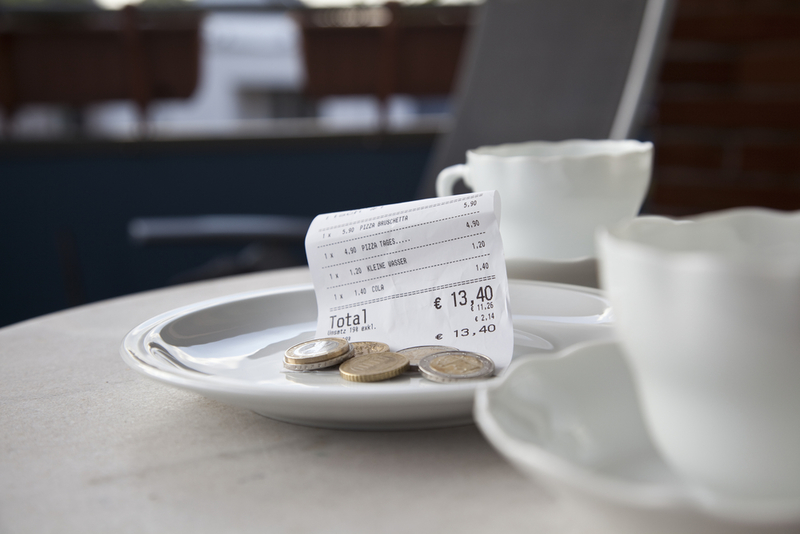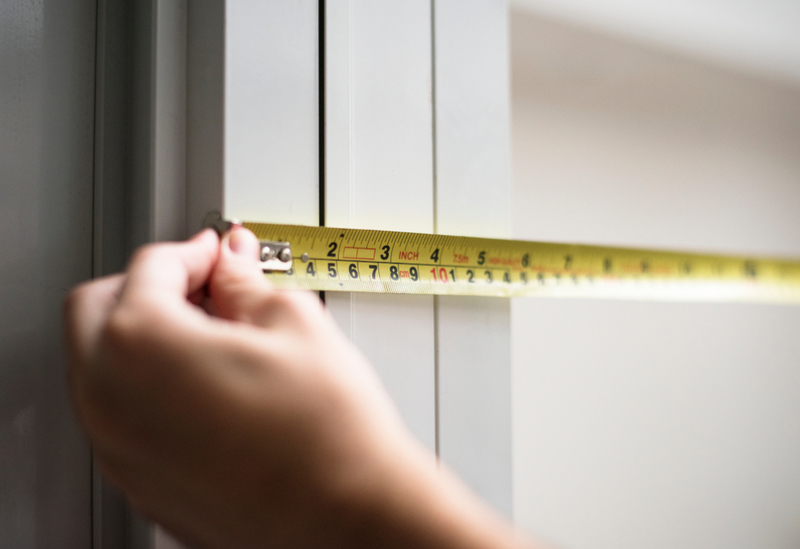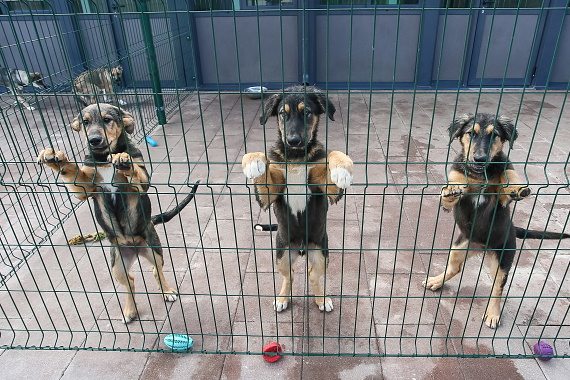
These US Traditions are a No-Go in Other Countries

But in some cases, a simple, innocent hand gesture or other action may be offensive when you’re visiting another country, and you may even wind up breaking the law. In other cases, you’ll be met with some raised eyebrows and questionable glances. Still, these customs are best left in the States!
Tipping
In the US, tipping is customary when receiving a service, especially if that service is continuous, as in a waitress or waiter serving you throughout your lunch hour, etc. It’s standard in the US to tip at least 10-15% on your total bill, and, if it’s particularly good service (they go above and beyond,) it’s usually closer to 20%. But in other countries?

In some countries, like Japan or South Korea, tipping is seen as offensive. If they do a great job, just let them know instead.
Thumbs Up
When in the US, a thumbs up usually means “good.” It can be a signal to your friend from across the room that you found a table, or your other friend, etc. Or, it can mean they’re good to go and that you’ll be fine without them, etc. However, a thumbs up in another country can basically mean the same thing as the middle finger.

In fact, you never quite know what kind of derogatory slang you may be creating with your hands when you’re out of the US, so be very careful.
Making a Peace Sign
This two-fingered hand signal is almost always backed by good intentions in the US, and usually used to literally mean “peace.” But don’t use this sign overseas – especially if your palm is facing toward you when you do so – because that means the opposite!

It’s best just to keep the hand signals to an absolute minimum if you head to another country, especially if you’re going to Australia, Ireland, New Zealand, South Africa, and anywhere in the UK, where its deemed offensive.
Laughing with Your Mouth Open
While no one is going to think twice if you laugh with an open mouth in the US, it can be seen as something that’s very rude elsewhere, especially in Japan, where people, especially women, cover their mouths when they laugh. So just to be safe, if you’re on vacation in Tokyo, make sure to cover your mouth if you feel the giggles coming on, in the same way, you would if you had to cough, etc.

In fact, in Japan, women laughing out loud is a sign that one lacks grace and is frowned upon.
A Dash of Salt
Every American basically expects there to be the staple condiments accessible on the table for them; you know, salt, pepper, ketchup (or soy sauce, depending on the restaurant.) But don’t expect the same thing when traveling overseas – and don’t ask for any of it extra, either. It can be seen as a major insult to the chef, so just enjoy your meal as is (or sneak in your salt…)

In Japan, for instance, “hold the mayo” is no simple request, and can be seen as a burden on others – which is something no one wants to be.
Calling the US “America”
Even though you may be used to calling the States “America,” or saying, “Americans” in regard to those who live in the States, others can take offense to it. After all, the US isn’t all of America; it isn’t even all of North America. If you take a trip to Peru or elsewhere in South America, and refer to the US as America, it can be insensitive, and almost as if you’re erasing the existence of several other cultures.

It’s probably best just to reply “the United States” if anyone asks you where you live when you’re on vacation.
Sending Back an Order
Now, this can be insulting in the US as well, especially if it’s done without just cause. Some people are just way too picky and would be displeased with anything no matter how good it is. But if you’re served a dish that you’re unhappy with in the UK – you’re screwed.

If you call your waiter over to complain about the dish, you’re going to be met with dirty looks and probably not the service you expect. Sending food back can be seen as a major burden and big offense to the chef.
Being Late
This may be a common occurrence in the US, but it really shouldn’t be. It can be seen as a huge insult to tell someone you’ll meet them somewhere on time and arrive 15 minutes later, citing traffic as your excuse. Perhaps you should’ve planned for a bit more traffic? In any case, don’t even think about pulling that act in Germany. You definitely want to set some extra time aside to arrive on time.

Otherwise, you may accidentally offend someone. In South Korea, being even a little late is seen as a sign of disrespect as well.
Being on Time in Argentina
Although it may seem like arriving on time is the appropriate thing to do, in some cultures, it can be just as insulting as if you were to arrive much later than the scheduled time. Take Argentina, for instance. If you have a meeting in Argentina, make sure you plan on arriving fashionably late.

If you don’t, you’ll wind up insulting someone. Yep, showing up exactly at the agreed-upon time is a no-go in this South American country.
Taking Food Home
In the United States where we’re used to mega-portions of food, someone at the table nearly always ends up taking at least some of their meal home with them. But don’t ask for a doggie bag when you’re traveling to certain countries and certain areas of other countries.

In many places, to-go bags are banned, largely due to reasons of hygiene. In some areas of the UK, you won’t be able to get your food to go because of food poisoning liability.
The “OK” Sign
This hand sign has recently started becoming frowned upon in the States as well. But, depending on how it’s used, many still use it to mean simply “okay.” In some other countries, however, you do not want to make this hand gesture.

Planning a visit to France? Whatever you do, don’t sign “okay,” with your hands, not unless you want to call someone worthless, anyway.
Your Hands in Your Pockets
Putting your hands in your pockets in the US usually means one of a few things; you’re cold, you’re reaching for something, or you’re bored/it’s just kind of a reaction. Well, when you’re in Turkey, keep your hands out of your pockets! Otherwise, you’ll be signaling arrogance to the locals.

This is especially true when you’re in a conversation with someone. It is also seen as particularly disrespectful to shake someone’s hand with one hand with the other in your pocket.
Pulling a Leftie
You may not choose which hand is your dominant, but if you’re a “leftie,” you better try and use your right hand for – well, everything. The same thing goes for the Middle East and Africa; using your left hand in any of those countries to do things like pass food or drinks is seen as “dirty” and greatly offensive.

This is mainly because using the left hand is associated with handling your bodily business in the bathroom.
Opening Presents at the Party
In the US, it’s pretty customary to open gifts in front of those who give them at things like birthday and holiday parties, etc. But in most Asian countries, doing this is seen as a sign of disrespect. Apparently, ripping the present open in front of the person who hands it to you is seen as greedy, especially in China and India.

Just to be safe, wait until you get home (or back to the room) to open your gifts.
Needing Your Space
These days, personal space is a right of passage in many more places, considering the worldwide pandemic. Personal space in a lot of countries was basically non-existent. In many cases, it’s because there are just too many people in small areas to make it possible.

Of course, personal space is pretty much a given in 2020, and in many places, if you get too close, you’ll be met with uncomfortable stares (or worse.)
Talking to Strangers
In the US, especially in places like clubs and bars, it’s not uncommon for strangers to strike up a conversation with another random stranger. And, although depending on the conversation and the manner in which it starts, it can be uncomfortable, it’s still pretty much expected in many cases.

But in other countries, you may be met with a raised eyebrow and cold shoulder, considering it can be seen as rude to interrupt someone’s day.
No Free Refills
In a lot of restaurants, okay, most restaurants in the US, free refills are expected. But when you’re on vacation, don’t think you’ll get the same kind of service – even if you’re drinking water. Be ready to pay for everything you consume and try and make your drinks last a little bit longer if you’re vacationing on a budget.

France actually used to offer free refills on soda until 2017 when they were banned, largely in part due to officials trying to combat obesity.
Smiling
Smiling at strangers may be customary, and the polite thing to do in many circumstances in the US, but the same can’t be said about a lot of other countries. In fact, it can be very off-putting and considered rude. In Russia, smiling in public makes you appear foolish or worse like you’re a sneaky person.

Smiles are reserved for intimate moments between friends and family, and smiling at strangers, as often done in the US, is seen as phony and insincere – and a lot of times, they definitely are.
Finishing Your Plate
In many places in the world, including some cultures in the US, not finishing your plate can be rude. After all, many cooks want to know that you’ve enjoyed their food so much, you ate every bite. But in some other countries, the opposite can be true. Take China, for example.

If you find yourself eating in a Chinese restaurant, or with the locals, and you finish all of the food on your plate, they will take it as a sign that you’re still hungry, which can be seen as offensive.
Not Acknowledging Someone’s Presence
In the US, in many places, it’s perfectly acceptable to entirely ignore the strangers going about their business around you. Take the hustle and bustle in NYC and other major cities.

If you greeted everyone who walked past you, you’d lose your voice. But in some places, including France, it can be seen as rude to not say “hello” to someone when they’re in your vicinity. A quick, “bonjour,” will do the trick.
Accepting Gifts
While it can be seen as rude to refuse a gift you’re given in the US, the opposite can be said of some other cultures. Just as in many Asian cultures where it’s seen as rude to open gifts in front of those who’ve gifted them to you, it can be seen as rude to even accept them in the first place.

You may be coined as greedy if you’re quick to take it off the giver’s hands. Many times, it’s also seen as offensive to hastily rip off the wrapping paper instead of taking time and care.
Talking About Careers
Just like in many cultures, it’s rude to simply walk up to a stranger and spark up a conversation, it’s rude to ask someone about what they do for a living. It’s taboo in a lot of countries, including the Netherlands, where it will make you appear like a classist to locals. If you do find yourself having an ice-breaking conversation with a stranger, avoid any job talk.

It can also be seen as offensive, especially in Arab countries, to ask your male colleagues about their wives.
Blowing Your Nose in Public
It’s pretty disgusting to blow your nose around other people, period. Particles can go airborne and fly around and smack strangers in the face and that’s just pretty grody. Because of this, it’s widely frowned upon in the US to blow your nose in places like eateries, and on public transportation, etc.

In countries like China, Japan, you’ve been expected to excuse yourself to the restroom to clear your nose.
Showing Your Soles
In many cultures, showing off the bottom of your feet around strangers can be seen as rude. As the lowest part of you that touches the ground, they can be viewed as dirty. In Dubai, for example, showing the soles of your feet or bottom of your shoes to someone else means you think of them as dirt.

In Arab cultures, people choose to keep their feet flat to the ground when in public because of this. Make sure to keep this in mind if you choose to take a trip to the UAE.
Walking Inside With Shoes on
While it may be common to walk into someone’s house (or apartment) with shoes on in the US, it is seen as offensive to do so in some countries. In fact, it’s pretty much a pan-Asian custom to remove one’s shoes when entering a house. In former Yugoslavia, it is frowned upon and seen as dirty – and truly, it can be, especially after walking through mud, or going on a hike.

In the UK, whether or not guests need to take off their shoes is typically left up to the discretion of the homeowner, just like in the US.
Going Shirtless
While you can’t walk a mile without seeing shirtless men on most of the beaches, and in a lot of warmer areas in the US during the summer, going without a top in some cultures is a no-go. In South Korea, men, especially older men, keep their t-shirts on, even while they’re in the water!

Women in the culture typically keep their shirts on at the beach as well. The younger the person, the more carefree they’re likely to be about wearing a shirt or not. Usually, vacationers don’t seem to follow suit – or, shirt.
Telling People to Help Themselves
In the US, we like to make our guests feel welcome, so welcome that we tell them to just help themselves to anything they want while they’re visiting. But this same type of interaction doesn’t happen like this in some other countries.

Thus, if you find yourself playing hostess in many Asian cultures, make sure you do just that, and bring your guests what they want/need.
Refusing to Eat
Have you been invited over to someone’s home specifically to eat? Don’t turn away the host’s meal when they try and hand you a plate in many cultures, including a lot of those in the Middle East. Heading to Lebanon? Don’t like the food you’re given? Tough. If you refuse it, it will probably offend someone.

Unless you’re highly allergic or something, just suck it up – or, eat it up. At the very least, take a bite/taste of everything that you’re given.
Hugging Others
I don’t know why this is still so big in some places in the US, either, because honestly – touching strangers is just weird and creepy – especially when you don’t know those people. And, in many places, including a lot of Arab and Asian countries, touching/hugging strangers is wildly inappropriate.

Just imagine a world where everyone keeps their hands to themselves!
Devil Horn Hand Signal
While KISS frontman Gene Simmons has tried to trademark the famous “devil horns” hand sign, other countries use it to signal marital infidelity. Yep, in Brazil, Portugal, Spain, and Columbia, the hand signal means that someone’s wife has been sleeping with someone outside of the marriage. Yikes.

Yeah, you don’t want to be on the wrong end of that misunderstanding. Of course, the sign has its own controversy in the US and elsewhere, as well, by those who are religious and believe it to be an actual sign of the devil.
Showing the Palm of Your Hand
Just like showing the bottom of your feet can be rude in many other cultures, so can showing someone the palm of your hand. In Greece, showing the palm, coupled with five spread fingers creates a hand sign known as the “Moutza,” which means pretty much the same thing as a middle finger in the US. Similar signs are used in Iranian, African, and Caribbean cultures.

In Iraq, quickly pushing your palm towards someone means they are worthy of shame.
Crossing Your Fingers
What do you think of when someone says, “cross your fingers?” It typically means you’re hoping that something will happen, and it’s a symbolic gesture that kind of throws your thoughts and intentions out into the universe. Of course, there’s also crossing your fingers behind your back when having a conversation, which can signal lying.

Unfortunately, doing the sign-in some other cultures can be incredibly offensive. Take Vietnam, where crossed fingers are the symbol of a woman’s private parts.
Using Your Hand to Beckon Someone
It’s not uncommon for friends, family members, and other familiar groups of people in the US to use their hands to signal for one another across loud or crowded rooms and other areas. But in some countries, like many places in Asia, doing so is seen as disrespectful. They believe beckoning is for non-human animals only and will refuse to respond and/or ignore you entirely.

In some cases, it depends on how exactly the signal is done. On the Caribbean Islands, using one finger for the motion says you see the person as a dog.
Showing Skin
This is probably pretty basic knowledge, in many places it can be seen as offensive to show off certain parts of the body. While it can be tempting on vacation in tropical areas to throw on a bikini and coverup and head to the beach, it’s actually banned in some countries. Take the UAE, where many beaches have banned swimwear for both men and women.

The same is true in Hvar, Croatia, a popular destination for the mega-rich and famous. In Uganda, women are arrested on a regular basis for wearing skirts that hit above the knee.
Using Crumpled Bills
When you go to pay with a hand full of crumpled, wadded up bills in the US, what happens? Nothing. The clerk may eye you suspiciously as they work to uncrumple them and put them in the register, but they’ll still accept them because, “money is money.” But the same can’t be said for many places that will flat out refuse to accept your bills if they aren’t in good condition.

That’s something to keep in mind when storing your cash on vacation – and a good reason to invest in a nice money belt.
Pointing
Pointing can be seen as rude in a variety of cultures, including in many places and circumstances in the US. Still, it doesn’t seem to stop people from using their index finger to “point” something out to others. In some countries, however, including Japan and Indonesia, it’s considered seriously offensive to point with your index finger. In Java, people commonly use their thumbs, just to be safe.

Disney employees in the US are actually banned from pointing with one finger since it’s widely regarded as being rude, and instead, you’ll always see them using two.
Eating in Public
In many parts of the world, it’s frowned upon and even illegal to eat and drink in public. We’re not talking about alcohol, either, which has its own set of laws throughout human society. But in many countries, eating your food in front of others, especially in certain situations is a big no-no. In Dubai, consuming any kind of food or beverage on public transportation is completely banned.

That’s understandable but would also be pretty bad if you had a long trip ahead of you. In Venice, don’t even think to stop anywhere other than a café to eat outside: it’s banned.
Deep Discussions
In the US, we take our freedom of speech very seriously – sometimes maybe a little too seriously. In many cases, it’s a no holds barred type deal, where once someone gets going, they just can’t stop talking, and you get to learn a lot about someone’s mental health when all you asked them was for a restaurant recommendation.

But in some places, like the UK, they take a “small talk or no talk” kind of approach when it comes to conversations over lunch or drinks. Have something on your mind? Save it for your therapist.
Pumpkin Spice Everything
In the US, when fall rolls around, it’s pumpkin anything and everything. Pumpkin spice lattes? Check. Pumpkin seeds? Definitely. Pumpkin doughnuts? What? Probably. It’s the US, we combine things that have no business being combined and call it delicious.

I truly do love my pumpkin spice, but we can take it a little overboard – which isn’t something you can say about other countries, who don’t praise the pumpkin nearly as much. Keep that in mind if you’re traveling in fall and BYOP (bring your own pumpkin!)
Refusing to Accept the Metric System
Like most Americans, if I ever run into a situation where I need to use the metric system to save my life: I don’t know what I’d do. That’s because we were programmed as kids to use the imperial system of measurement (feet, inches, etc.) And, do you know what? We’re one of just three countries in the entire world to do so.

The other countries: Myanmar and Liberia. Perhaps it’s time to make the switch! So, why is it exactly that the US doesn’t use the metric system?
The Way We Write Dates
Growing up in the US, you’re typically taught in school to write out your dates in the MM/DD/YY format. But, just like our system of measurement, nearly everyone else goes with DD/MM/YY, which can make for some serious confusion (and missed appointments.) After all, if you write 11/3, those from outside of the US likely read it as March 11th, even if it’s meant to read November 3rd, etc.

It can be a hard habit to break, but one that may be necessary if you’re planning on living in another country.
Baby Showers/ Gender Reveal Parties
This article is coming just days after yet another US couple throwing a “gender reveal” party for their child set more than 7,000 acres of California on fire using pyrotechnics to announce the birth of their kid, so that goes to show how seriously some take their baby showers and pre-baby celebrations.

If you’ve never heard of them, gender reveal parties are thrown to reveal whether the yet-to-be-born child is a male or female to friends and family – and they’re most definitely American.
Right on Red
The whole right-turn-on red-thing can be pretty confusing to those visiting the US from other countries, though it can confuse Americans, too – I’ve seen plenty of it. For the most part, outside of NYC, turning right on red in the States is pretty much a given, unless there’s a sign posted that specifically warns against it.

But if you’re traveling outside of the US, it’s best to just stop and stay put on red, especially if you’re unfamiliar with the local traffic laws. In most other countries, red means full stop, period.
Eating Big Meals
Our portions are pretty big almost anywhere you choose to eat in the US. In fact, in a lot of cases, it’s expected. Just take the Burger King “Whopper,” or the “Big Mac” at McDonald’s. No one’s lining up for a “Little Mac.” In Texas, the state’s unofficial saying is “everything’s bigger in Texas.”

And, usually all of this grub this translates to either stuffing ourselves silly or having leftovers/food for Fido. In other countries, however, don’t expect the same kind of monstrous servings.
Options, Options, and More Options
If you asked me to tell you some of the most American corporations in the world, I’d go with McDonald’s and Walmart. Walmart is a perfect example of so many things that define US culture – which can be pretty terrifying. But it also goes to show how much we value our variety and ability to choose products in a number of flavors/textures, etc.

You can get pretty much anything in a Walmart, from the exact thing you need to make your dinner, to the new tire you need to get home.
College Football Parties
Sure, there’s the World Cup, and plenty of hyped-up football fans all over the globe. Though, on their game days, they typically choose to just meet up at a pub and/or at the actual game. The concept of tailgating in the parking lot (or further, which is even stranger) is just plain odd to those who aren’t from the US.

It’s kind of odd to some of those of us who are, too, especially those of us who try to avoid crowded traffic situations. In other countries, tailgating only means following too closely.
Student Loan Debt
This is a huge crack in the system of American society and a major problem, that so many people are in massive amounts of debt (over $100,000,) just because they wanted to better themselves and earn a higher education. In other countries, higher education is given to citizens, no questions asked.

Take Denmark, for instance, who offers free tuition and is repeatedly named as one of the best countries to live in on numerous lists, and the one whose people are happiest.
Trick or Treating
Trick or treating is definitely an American thing. And, while it was one of my favorite Halloween activities growing up, I can see why others consider it strange for random children to run all over neighborhoods and approach stranger’s doors to ask them for candy.

It’s pretty creepy actually, and can even be quite dangerous.
Eating Dinner at 6 PM
When you live in the US and decide to go out for dinner, the busiest times will typically be between 6-8 PM, with the most people arriving/eating around 6:30-7. But in other parts of the world, this is seen as way too early to sit down to eat. In a lot of countries, it’s more common to eat between 8-10 PM.

In a lot of South America, the earliest time people will gather to eat is 8 PM, and in Argentina, it’s more like 9-10.
All Work, No Play
Well, it’s no wonder with a broken healthcare and student loan system that people find themselves working a crazy number of hours with very little time off each year. In fact, the US is the most overworked nation in the world and the only country in the Americas with no parental leave benefits.

Meanwhile, 134 other countries have laws that cap the maximum number of hours worked per week – the US is not one of them.
Avoiding Confrontation
There is a large air of phoniness around a lot of relationships in the US. And, along with them, there is a lot of beating around the bush when it comes to interactions. People seem to have a hard time expressing their feelings, which can result in quite a lot of tension and lots of cold shoulders.

Unfortunately, it also leaves a lot of problems unresolved, when they could have been fixed had someone just said something directly, to begin with.
Being Overly Optimistic
Now, this certainly doesn’t apply to every American, but there is a large bunch that will just completely ignore the world being on fire and tries and convince themselves, and everyone around them, that everything is just amazing.

It’s also pretty much a given that, when you work in the service industry, you’ll have to say things like, “welcome sir/mam,” and, “have a wonderful day,” when they leave. But don’t expect the same kind of mannerisms elsewhere.

What’s in a Name? How Your Favorite Bands Chose Their Moniker

More of the Best Guitarists Throughout History

The Kids Are Alright: These Celebs Are Expert Co-parents

Why Halva Might Be the Most Culturally Diverse Candy Ever

A Cellist in Sarasota Helps Shelter Dogs With Music

Show Stopper: Meet Glenn Close’s Adorable Date at the Independent Spirit Awards

The Ugly Truth Behind Cat Cafes

More of The Most Embarrassing Red Carpet Moments That Will Make You Cringe

Must See Camping Photos That’ll Make Your Day!

Wedding Dresses Like You Have Never Seen Before























